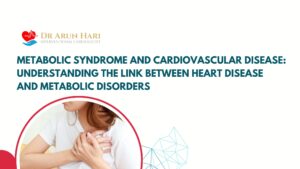Why Is Regular Heart Health Checkup Required?
From What Age, One Should Get the Heart Health Checkup Done Regularly?
Get Your Heart Health Checkup Done by Doctor Arun
Testing Is More Important Than Resting – Take Your Wakeup Call Today!
Wake up and Get the Checkup!
Heart-health checkup is the essential assessment conducted to monitor & evaluate the overall health of an individual’s cardiovascular system. These screenings are crucial in identifying the various risk factors for different types of heart diseases, which happen to be the leading cause of deaths worldwide.
Heart Health Checkup
Here are some key heart health checkup screenings:
- Blood Pressure Measurement:
-
-
- Purpose: It assesses the force of blood against the walls of the arteries. High BP or hypertension happens to be a very significant risk factor for heart related ailments.
- Frequency: Regular blood pressure checks are recommended, at least once in every 2 years for individuals with normal BP, and more frequently for those with high BP count.
-
- Fasting Lipoprotein Profile (Cholesterol Test):
-
-
- Purpose: This test measures the levels of cholesterol in the blood, including HDL (High-Density Lipoprotein), LDL (Low-Density Lipoprotein), and triglycerides.
- Frequency: One must get this test done every four to six years (for adults), or more frequently for individuals with known high cholesterol or those at higher risk.
-
- Body Weight & Body Mass Index (BMI):
-
-
- Purpose: This test particularly helps to assess whether a person is underweight, normal weight, overweight, or obese. It is a no brainer that obesity makes a person more prone to develop a heart disease.
- Frequency: At least once annually, or as advised by a healthcare professional.
-
- Blood Glucose Test:
-
-
- Purpose: This test helps in measuring the level of glucose (sugar) in the blood. High blood sugar can indicate diabetes, which is a major risk factor for heart disease.
- Frequency: Depending on the individual’s risk factors and age, it may be done every one to three years.
-
- Electrocardiogram (ECG or EKG):
-
-
- Purpose: It records the electrical activity of the heart over a period of time. This testing detects irregularities in heart rhythm & structure.
- Frequency: Depending on risk factors and age, this testing may be done as part of routine check-ups or more frequently for individuals with known heart conditions.
-
- Lifestyle Factors:
-
-
- Smoking: Regular assessments of smoking habits are important, as smoking significantly increases the risk of heart disease.
- Physical Activity: Evaluating the level of physical activity helps in determining whether an individual is meeting recommended exercise guidelines, which is crucial for heart health.
- Dietary Assessment: Understanding an individual’s dietary habits, especially in terms of saturated fats, trans fats, sodium, and fibre intake, is important for heart health.
-
- Stress Testing:
-
-
- Purpose: This assessment tests how well the heart functions during physical activity. Such testing helps to diagnose coronary artery disease or evaluate the effectiveness of heart disease treatments.
- Frequency: As advised by a healthcare professional based on an individual’s specific circumstances.
-
- Coronary Calcium Scoring:
-
- Purpose: It uses a CT scan to detect & measure calcium-containing plaque in the coronary arteries. This can help in assessing the risk of a heart attack.
- Frequency: Typically performed once for individuals at higher risk of heart disease.
Why Do You Need Regular Heart Health Checkups?
Here are some key regular heart health checkups are crucial for several reasons:
Early Detection of Risk Factors
Regular screenings can identify risk factors for heart disease at an early stage. This allows for interventions & lifestyle modifications that can significantly reduce the risk of developing heart-related problems.
Prevention & Management of Heart Disease
Early detection of risk factors allows for proactive measures to prevent heart disease. For individuals who already have heart disease, regular checkups help in managing & controlling the condition effectively.
Monitor Progression of Existing Conditions
For individuals with pre-existing heart conditions, regular checkups are essential for monitoring the progression of the disease and ensuring that the treatment plans are effective.
Customized Treatment Plans
Regular checkups enable healthcare providers to create personalized treatment plans based on an individual’s specific risk factors, health history, and lifestyle.
Blood Pressure Management
High BP is a silent condition that often has no noticeable symptoms. Regular BP monitoring helps in identifying & managing hypertension early, reducing the risk of heart disease.
Cholesterol Control
Regular lipid profile checks help in monitoring cholesterol levels. Higher level of LDL cholesterol in the body could possibly lead to plaque buildup inside the arteries, which in turn increases the chances of developing a heart disease.
Diabetes Management
Diabetes is a significant risk factor for heart disease. Regular blood glucose tests help in managing diabetes effectively, reducing the risk of cardiovascular complications.
Detecting Irregular Heartbeats
Tests like electrocardiograms (ECGs) can detect irregular heart rhythms, which may indicate an underlying heart condition.
Assessment of Lifestyle Factors
Regular checkups provide an opportunity to assess lifestyle factors like smoking, physical activity, and diet. These factors play a significant role in heart health.
Coronary Artery Disease Screening
Some tests like stress tests & coronary calcium scoring can help in evaluating the presence & severity of coronary artery disease.
From What Age Do You Need Regular Heart Health Checkup?
As for the age to start regular heart health checkups, it is as follows:
- For adults under 40: Periodic checkups every 2-5 years, depending on individual risk factors & family history.
- For adults in the age bracket of 40 years to 75 years: Annual or biennial checkups, or as recommended by a healthcare provider. The frequency may increase if there are significant risk factors.
- For adults over 75 years of age: Regular checkups are important, and the frequency depends on individual’s health status & risk factors.
However, it is significant to note here that these happen to be the general guidelines, and these may vary based on individual health, family history, and existing conditions. So, it is always best to consult a healthcare provider for personalized recommendations regarding heart health checkups.
Get Your Heart Health Checkup by Doctor Arun
Remember, the frequency of these heart health checkup tests may vary based on an individual’s age, gender, family history, and existing health conditions. You can consult Doctor Arun, who is a specialised healthcare provider, for personalized recommendations. Additionally, maintaining a healthy lifestyle through regular exercise, a balanced diet, and avoiding tobacco is key to preventing heart disease(s).




